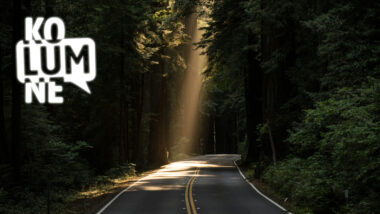Beginning of last week we had the opportunity to interview Lawrence Lessig in Berlin. Lawrence Lessig is author of several books, US-American law professor at the Stanford Law School and joint founder of Creative Commons. At present for the timespan of a year he resides as Fellow at the American Academy in Berlin. He withdrew himself to write two further books. Despite a cold and some coughs he reserved nearly one hour to explain different topics in detail.
The result can be seen here. I cut the whole interview into small parts, so that each block consists of question and answer. While cutting an idea came up to give out the whole interview under a Creative Commons license to provide most freedoms including remixing and commercial use. The individual blocks are .dv files in an almost uncompressed condition (caution: some files are over 1 GB! *). To a large extend there are also versions in OGG Theora and some AVI with the NetzpolitikTV intro, which the Wetterfrosch has created. **
There are surely many readers, that are much more gifted in the art of video mixing then myself with my presently rare time and limited creativity. Therefore play with the video as you like: The only rule is to obey the Creative Commons attribution license. All remixes must reference to netzpolitik.org***. That’s it. Add subtext, rearrange it ore even substitute my role as interviewer, improve questions or underlay some music, insert special fx, or do a best of. I am looking forward to your creativity. Results can be posted into the comments-section. And here is the interview:
1) What is Creative Commons?
DV, OGG
Lessig explains some incentives for the establishment of Creative Commons. CC is a substitute of traditional copyright with a different set of ethics.
2) Creative Commons licenses explained: The difference between non-commercial and commercial use?
DV, OGG
Lessig points out that one should accept the wish of some users that their work shall not be commercially used without permission. There are different standards for different groups. Its difficult to draw a line. He names some blurry areas, e.g. Blogs with advertisement. CC has not to draw lines but to give humans a tool to signal their chosen liberties and restrictions. By this a discussion is already set on.
3) How can one mark files as Creative Commons licensed?
DV, AVI, OGG
The technology in digital objects already enables a tracking. At present an important tool is the CC-Publisher.
4) What are “hybrid economies” and “sharing economies”? What are working business models based on “sharing”?
DV, OGG
There are different environments of creativity. The traditional model is valuable, however it is not the only source of creativity. The life of each individual is divided into both models of economics. In business there are hybrid approaches. The difficulty is the separation of motivations within a business model (“The-Redhat-Danger-of-Pollution”). Second Life, MySpace: In order to make money, they are hybrid. ITunes is not hybrid. Flickr is very hybrid. Wikipedia is purely sharing. But money doesn’t work at Wikipedia. All three economies have a place, but the hybrids will increasingly gain a bigger part.
5) What is wrong with copy protection systems?
DV, OGG
In order to understand the problems of copy protection, one must understand the different economies. Lessig thinks television is not practical. ReadOnly is interspersed by big media. ReadWrite gives more liberties. DRM supports the ReadOnly vision and locks out RW. To protect RO we need other tools. Comparison to insect fight means.
6) Information ecology: What can the Free Culture movement learn of the environmental movement and what are the pictures of the Free Culture movement?
DV, AVI, OGG
Lessig means, one must see the problem in an economic way and if the society does, then the thing becomes an issue of politics. Chernobyl is the couch Potato. Dead culture.
7) What is the Science Commons and what’s different compared to Creative Commons?
DV, AVI, OGG
Simple tools. How can one hack the juridical system in a way that makes the scientists happy?
8) Exploitation corporations like the (german) GEMA accept no Creative Commons licensing, are there any entitled reasons given?
DV, AVI, OGG
In the states the exploitation corporations are not exclusive. A general problem is that those do not understand that there are uses, which should not be taxed. J.P. Sousa and so. Sing at the campfire or under the shower. With CC one can make the difference. If one would try to adjust everything, it would be very expensive. One must draw a line and that needs big discussions.
9) What chances do the Creative Commons licenses offer to NGOs?
DV, AVI, OGG
Everyone has to reconsider its own ethics. People in NGOs are no better humans. They should recognize which ways to collect money are effective. They should recognize that knowledge should be spread.
10) The net neutrality debate – what is that about?
DV, AVI, OGG
Internet historically comes from the telephone. Since 2005 there is no more adjustment for broadband. Now the providers can discriminate. That can obstruct small innovative enterprises, because the providers can obstruct them in order to follow their own interests.
11) What would Lessig tell the German politicians that reform copyright?
DV, AVI, OGG
One should rather think practically than religious. One should not follow a principle, but rather understand copyright as tool, that is to be applied wisely. It should purely offer an incentive for creation. Copyright extension makes no sense, since the work already has been made. One also should not simply generally extend. Most works won’t have a commercial value anyway. One establishes thus rather senseless fences. Thus more damage than use.
12) Conclusion: Which license for this interview?
DV, AVI, OGG
Simple attribution license is preferred, but it is your liberty.
And here is the interview again as pure audio files, alternatively as OGG Vorbis and as MP3.
* Traffic is rather no problem at the current Netzpolitik-server. The major problem was to put all files on-line. I felt that these ages are not fit enough yet to place several gigabyte video data on-line.
** The Outro of the OGGs and AVIs still refers to another CC license, as I noticed. The CC simple attribution license applies there as well. I am the author and I just say so.
*** Of course we would be happy, if the involved ones are mentioned in the credits. Involved were Markus Beckedahl (interviewer and raw cut), Mario Behling (camera) and Andreas Pohl (assistant).




Hello,
We (netwaves-team) make a radioprogram about Creative Commons-music and interview artists, labels, etc. In our next episode we will use, correctly off course :-), this very good interview. I already had another one but this is much better. You will be able to listen to it from 16 january on our site,
kind regards, Jan, Netwaves.